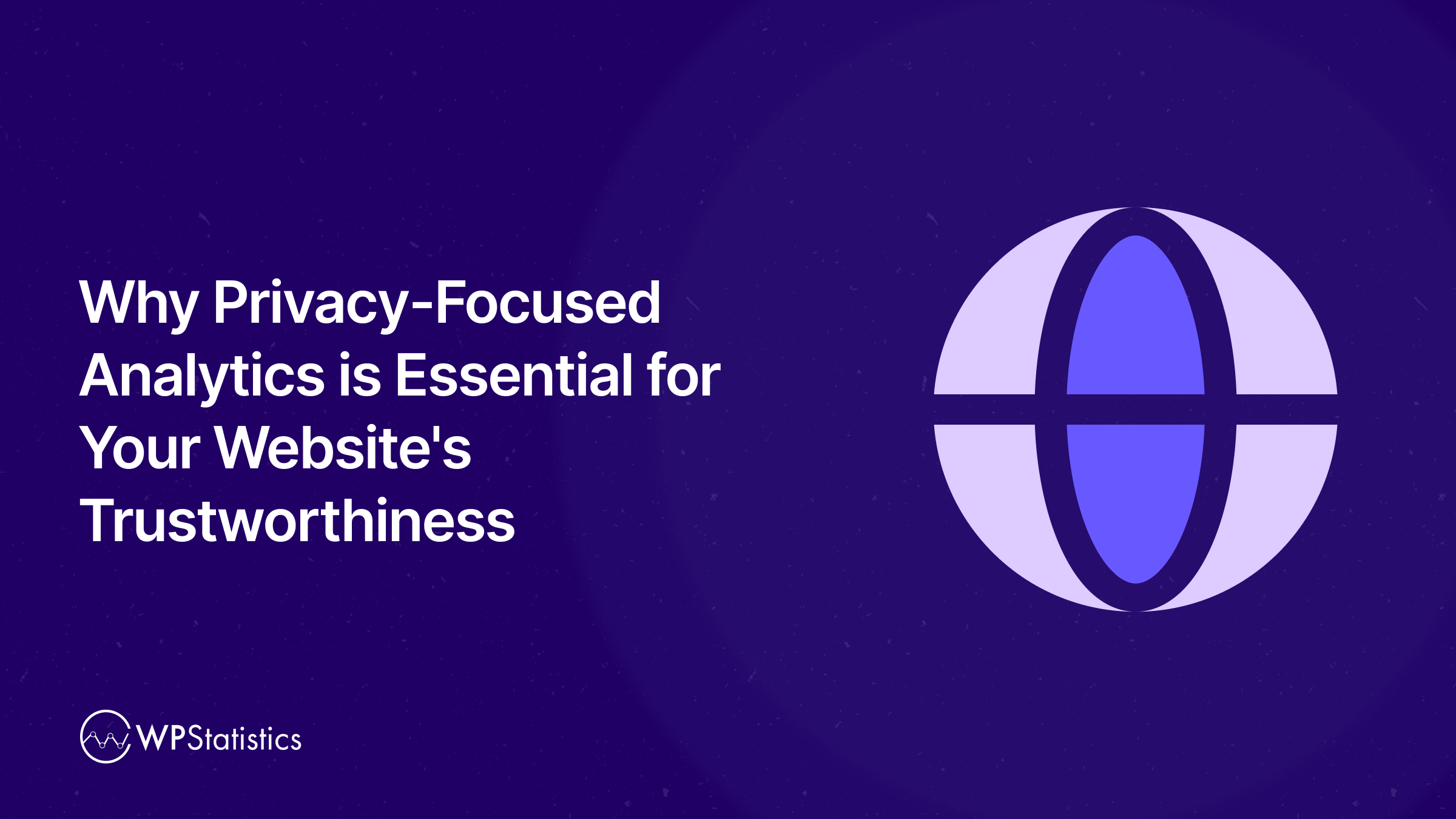It’s important to keep your website updated with the latest trends, especially in terms of privacy and legal matters. As you know, user Privacy and data protection regulations are becoming increasingly stricter.
Conventional web analytics tools track and store many personal data from your website’s visitors, and that’s a big concern these days.
Fortunately, modern analytics tools use non-intrusive tracking methods that can be trusted as alternatives to Google Analytics.
If you have a website and respect privacy, you’d better get familiar with these tools and think of using them instead of GA4.
The following article will explain why privacy-focused analytics is essential for the future of your website and introduce the best tools in this regard.
What Is Privacy-Focused Web Analytics?
A privacy-focused web analytics tool is any platform that protects user privacy.
Traditional services like Google Analytics collect vast amounts of data, including IP addresses and browser fingerprints.
Moreover, they usually share that data with third-party services that might put the privacy of people at risk.
That’s why privacy-first tools have become popular as they try to analyze websites with minimal data collection. In fact, user anonymity and no dependency on cookies are key aspects of privacy-focused web analytics tools.
In other words, we can say that traditional tools use invasive tracking methods, but privacy-focused analytics avoid them.
The following table summarizes key differences between privacy-focused analytics and traditional tools:
| Feature | Privacy-Focused Analytics | Traditional Analytics |
| IP Tracking | IPs are anonymized or skipped | IPs are collected and stored |
| Data Collection | Uses secure first-party data | Relies on third-party tracking |
| Self-Hosting | Data stays on your server | Data stored by the provider |
| Cookie Banners | Often not required | Usually required |
| Legal Compliance | Built-in GDPR/CCPA compliance | Needs manual setup, risky |
| Data Ownership | You fully own the data | Provider controls the data |
| User Tracking | No personal tracking | Tracks users across sites |
Why Privacy-Focused Analytics is Essential for Your Site?
Now, let’s review the benefits of using privacy-focused analytics tools for your website:
1. Boosts Trust and Transparency
Users are now aware of the internet threats regarding the security of their personal information.
This privacy consciousness is gradually increasing, and people try to use:
- Ad blockers
- Read cookie banners
- Avoid intrusive websites
When you use privacy-focused analytics, you show your website visitors that you respect their privacy, leading to higher credibility. Of course, trust means higher engagement and conversion rates for your website.
This is particularly important in sensitive industries like health, finance, or education because you’re working with critical data.
2. Helps You Stay Legally Compliant
Regulations like GDPR, CCPA, HIPAA, and PECR have recently become much more important in the internet industry.
These rules ensure that websites collect and store personal data responsibly. Please bear in mind that you’ll face significant penalties if you violate these regulations.
The following table compares these regulations in sensitive industries:
| Industry | Key Regulations | Why Privacy-Focused Analytics is Needed |
| Healthcare | HIPAA, GDPR | Prevents exposure of patient data |
| Finance | GLBA, PSD2, GDPR | Ensures secure handling of client info |
| Education | FERPA, GDPR | Protects student records from tracking |
| All Sectors (EU) | GDPR, ePrivacy Directive | Block tracking without clear user consent |
Traditional analytics tools usually need complex consent setups to ensure the user knows what these tools are collecting. Of course, there is still a risk of non-compliance.
On the other hand, privacy-first tools are designed to minimize data exposure. This is especially significant when you use cookieless tracking and anonymous IP methods.
3. Improves Website Speed and SEO
Traditional analytics methods usually use heavy scripts that are often large and slow to load. This can impact page speed, which is a key factor in SEO.
So, third-party servers that use traditional methods are not SEO-friendly. On the other hand, privacy-first tools use lightweight scripts and operate without cookies.
As a result, they can improve the user experience and boost your Core Web Vitals score, compared to traditional methods.
4. Eliminates the Need for Consent Banners
As traditional analytics use cookies or personal identifiers, they need to get user consent. In other words, you have to show cookie banners, which is annoying for users.
Sometimes, these banners disrupt the user experience and cause drop-offs. Privacy-focused tools that operate without cookies don’t legally need to show a banner. This makes your website homepage cleaner and faster, and improves user experience.
5. Makes Your Website Ready for the Future
The digital world is expected to experience a cookieless future. For example, browsers like Safari and Firefox are now blocking third-party cookies by default. More importantly, Google Chrome is considering removing them.
Traditional analytics tools are working based on cookies and might face significant problems in the future.
On the contrary, privacy-first tools bring peace of mind as they are already optimized for a cookie-free web. So, you don’t need to change your analytics strategy in the long term.
6. Improves Ownership and Control
As said earlier, traditional tools store your website data on their servers and might even share or monetize it.
For example, Google Analytics has violated European data protection rules because it transfers user data to U.S. servers. The data might include IP addresses and identifiers that are so critical.
So, this will increase the privacy risks of your business and limit what you can do with the data.
Privacy-focused analytics tools usually offer self-hosted services that allow you to have full control over your data and ensure full transparency.
In fact, you know exactly:
- What’s collected
- How it’s stored
- Who has access
The Best Privacy-First Analytics Tools in 2025
Looking for privacy-focused alternatives to Google Analytics? Here are the top picks for 2025:
1. WP Statistics
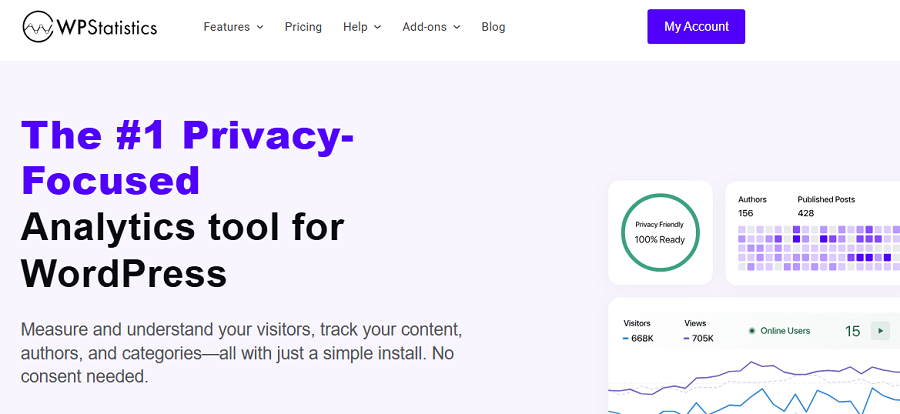
This is one of the best open-source web analytics plugins for WordPress websites. It’s a privacy-first analytics tool that respects GDPR and gives you full data control.
When you use this plugin, you can be sure that all data is stored on your server, with no external requests or trackers.
Initially, it used to track data using a server-side approach, but it’s now a client-side tracking tool.
Look at the key features and benefits of WP Statistics:
- 100% self-hosted
- GDPR and PECR compliant
- Advanced dashboards inside WordPress
- Anonymous IP tracking methods are available
- Real-time tracking
- Author performance analytics
Apart from these features, it offers great add-ons to provide advanced capabilities. Overall, WP Statistics is a great choice for WordPress sites that pay attention to privacy and don’t want to switch their dashboard when tracking the site.
That’s why it has more than 600,000 active installations around the world. If you want to join this great community, you just need to go to your dashboard, click “Add Plugin” under “Plugins” and search for WP Statistics.
2. Plausible Analytics
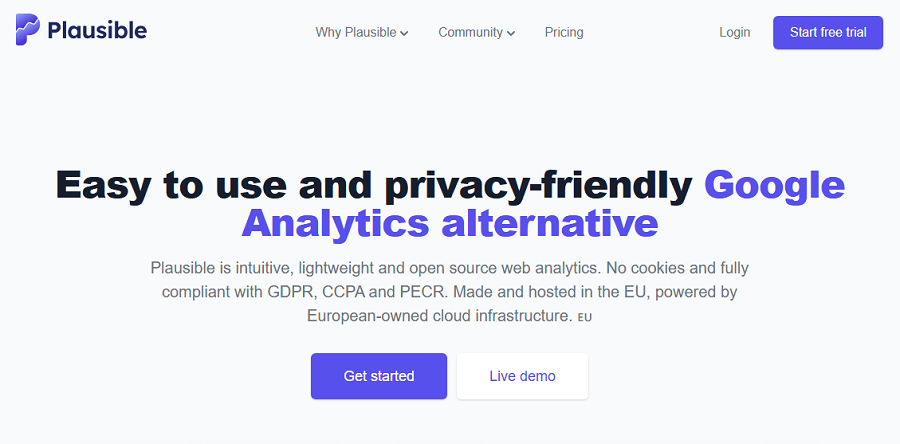
Plausible is also an open-source web analytics tool that uses cookieless tracking methods to analyze your site’s performance.
It’s well-known for being fast, minimal, and respecting user privacy, which is trusted by more than 50,000 websites around the world.
If you want a lightweight tool with a simple interface and no personal data tracking, this can be the best choice for you.
It uses server-side tracking and can be considered a reliable privacy-focused alternative to Google Analytics.
3. Matomo
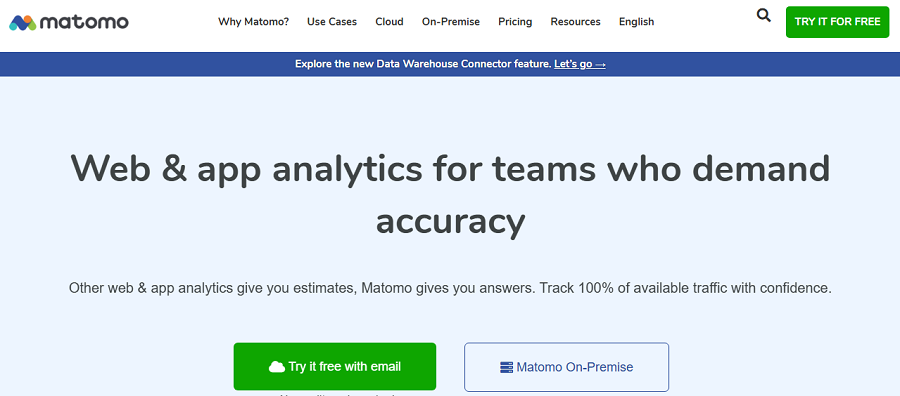
Matomo is a simple and reliable web analytics tool that puts privacy first. It’s a famous self-hosted platform with advanced features, including:
- Complete Analytics
- Intranet Analytics
- Consent-Free Tracking
- Tracking Personal Data
- Marketing Attribution
- No Limitations
- Log Analytics
You can rely on its first-party data collection approach and customize tracking options according to your needs.
4. Fathom Analytics
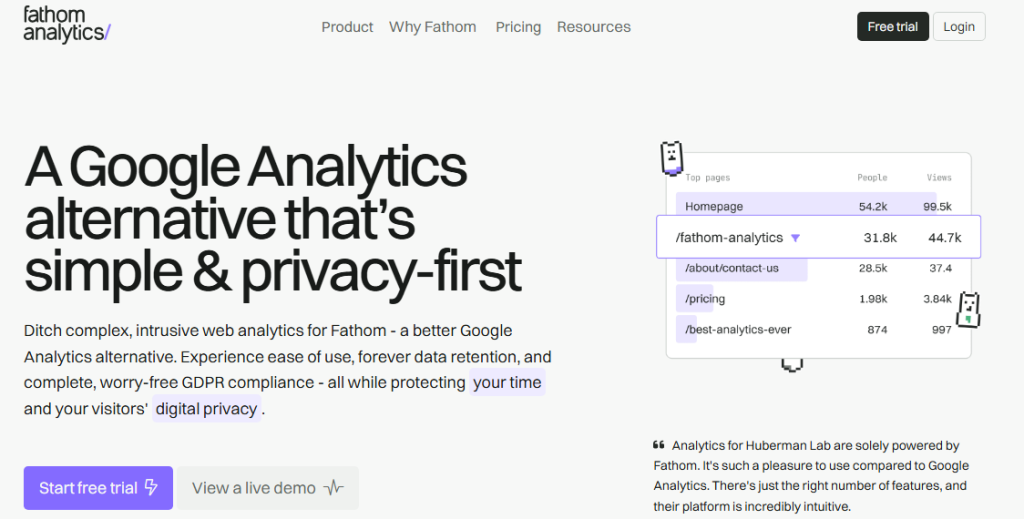
Fathom is a fast, no-cookie web analytics tool with a wide variety of features. It’s fully compliant, while it doesn’t require tracking consent.
It offers a simple dashboard with lots of features, including:
- Event tracking
- Detailed reports
- Campaigns & newsletters
- Keeping data forever
- Great for SEO
- Handling any traffic spikes
- Designed for developers
Overall, Fathom is ideal for marketers and entrepreneurs who respect privacy.
5. GoatCounter
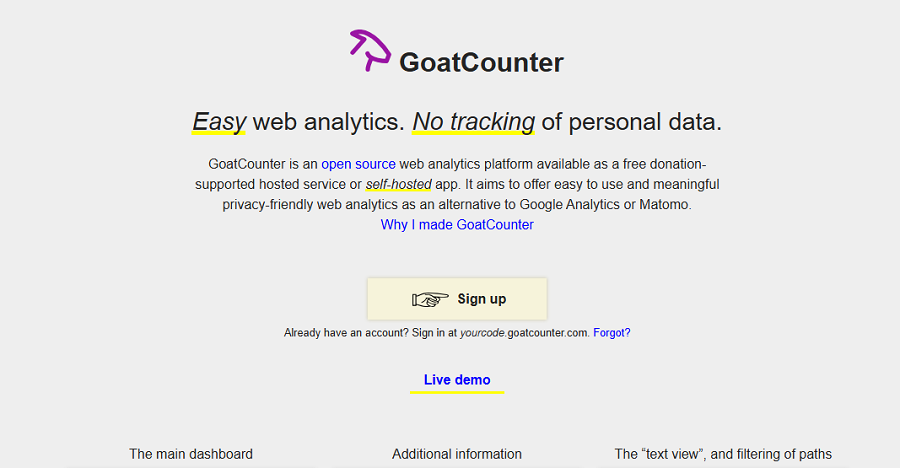
Last but not least, GoatCounter is a self-hosted tool that offers a free, privacy-focused tracking service.
It’s a minimalist, open-source platform that is perfect for smaller projects and developers. Here are its key features and benefits that make it a great alternative to Google Analytics.
- Simple to use
- Open-source code
- Built-in privacy controls
- Lightweight and fast
Finally, it’s good to compare these tools to see which one is suitable for your business:
| Tool | Best For | Hosting | Cookie-Free | GDPR |
| WP Statistics | WordPress users | Self-hosted | ✅ Yes | ✅ Yes |
| Plausible | Lightweight, simple sites | Cloud/Self-hosted | ✅ Yes | ✅ Yes |
| Matomo (Self) | Enterprise-level control | Self-hosted | ⚠️ Optional | ✅ Yes |
| Fathom Analytics | Business & marketing teams | Cloud-based | ✅ Yes | ✅ Yes |
| GoatCounter | Developers & minimalist use | Cloud/Self-hosted | ✅ Yes | ✅ Yes |
Conclusion
Privacy and data protection are among the most critical concerns of website owners, especially in sensitive sectors. Third-party tracking tools are usually intrusive and collect and store personal data, and even sell it. That’s why you need to get familiar with the first-party data collection benefits and learn how to switch to privacy-first analytics. We explain why privacy-focused analytics is essential for your website and what tools you can use as alternatives to GA4.
FAQs
What is privacy in data analytics?
It is the process of collecting and analyzing data in a way that protects your visitors’ personal information. Additionally, you must comply with data protection regulations like GDPR.
Do I need a privacy policy if I use Google Analytics?
Yes, because Google Analytics collects personal data like IP addresses. So, a privacy policy is legally required according to most regulations.
What is privacy-preserving analytics?
It’s a method of tracking website performance without collecting/storing personal information.
Is data analytics a threat to individual privacy?
It might be if it’s misused. If you collect personal information without consent, you might put your business at risk of violating data protection laws.

